14 Five Ministry Challenges I Didn’t Anticipate
HERSHAEL W. YORK22 What Does it Mean To Be a Shepherd Leader?


A Lifetime of Faithfulness begins with an education that
is Trusted for Truth
SBTS.EDU


14 Five Ministry Challenges I Didn’t Anticipate
HERSHAEL W. YORK22 What Does it Mean To Be a Shepherd Leader?


A Lifetime of Faithfulness begins with an education that

ALBERTMOHLER.COM
ocial change used to come slowly. Think of the Middle Ages, often dismissed as the Dark Ages. Social structures and patterns did change over time, but that usually mean a lot of time. Generation after generation could pass with little change to the society and little sense of change.
Our times are dramatically different. Social change now comes quickly, measured by months and days, rather than decades and centuries. Sociologists sometimes refer to this as “social velocity,” and most of us feel it happening all around us.
Pastors and preachers feel this change taking place, sense its importance, and can trace the effects of such massive change in the experience of a congregation and the individual lives of believers. Time and space are collapsing as the role of the pastor now demands a rather urgent understanding of what is happening in the world around us – and in the world experienced by church members.
The world that provided the social context for this institution through more than a century and a half is gone – utterly gone. In my own lifetime we have shifted from concern that church would be co-opted by cultural Christianity to the concern that we are now in a post-Christian culture that threatens religious liberty. Now, the concern of most pastors is not that their church members will be seduced by the culture, but that the culture itself poses a direct threat to Christian faithfulness. The danger of seduction has given way to the danger of intimidation.
The only proper Christian response to the challenge of a post-Christian culture is deeper conviction and increased boldness. Pastors must preach the Word with undiluted conviction, unmatched clarity, and unquestioned courage. Otherwise, all is lost. Just look at the social science data that underlines the postChristian condition of younger Americans.
@ALBERTMOHLER
On the other hand, consider the thousands of young men studying to be faithful pastors right now through Southern Seminary. I am in awe of what God is doing as so many young people are responding with the full measure of conviction, knowing exactly how they are seen by a post-Christian culture. With them, I am invigorated by the challenge of raising up a generation of young men coming to be made ready for a lifetime of gospel ministry. They have already been swimming against the currents of their own generation. They have come to Southern Seminary because they want a bold and convictional theological education. They want Bible – lots of it. They want doctrine – all of it. They want ministry training – and they soak it up. Who would not be invigorated by that?
Do you want to be encouraged? Come see what God is doing at Southern Seminary as the next generation of “soldiers of Christ, in truth arrayed” is readied for deployment. These students are serious, convictional, devotional, and joyful. They know the landscape of the post-modern world and they are determined to preach Christ and lead gospel churches. They match seriousness with sweetness. God is doing something marvelous in this generation and right here at Southern Seminary and Boyce College. Come see it for ourself, pray for us, and thank God for calling out the called in this generation. How kind of God to let us be a part of all this.
R. Albert Mohler, Jr.
From its inception in 1859, The Southern Baptist Theological Seminary has existed primarily to educate, train, and prepare pastors for a lifetime of ministry faithfulness. Over the past 160 years, the commitment of Southern Seminary to train pastors, under the Lordship of Jesus Christ, has not changed. However, the context in which pastors are called to minister continues to change rapidly. Today, pastors face challenges such as the rise of secularism, the decline of religious participation, and the increasing complexity of social issues.
Hebrews 13:8 reminds us, "Jesus Christ is the same yesterday and today and forever” (ESV). The immutability of God gives comfort that amid a rapidly changing world, God remains constant. Throughout Scripture, there are many examples of the people of God experiencing significant change as leaders came and went, and nation after nation rose to become the dominant power of the day. During this change, the prophets faithfully urged God's people to remember Him. To remember the covenant He had made. To remember the relationship He had invited them into. In periods of economic success and periods of exile, God did not change.
This reminder is of great comfort as we remind ourselves that no matter how much the world changes, God does not change.
Similarly, God’s call to pastors has not changed. Paul instructs Timothy to “preach the word; be ready in season and out of season; reprove, rebuke, and exhort, with complete patience and teaching” (2 Tim. 4:2). The pastoral task set before Timothy remains the same one set before pastors today: preach God's word faithfully, and lead God's people patiently. While aspects of this task will look unique to each pastor called by God, it is a comforting reminder of how unchanged and unchanging the task given to pastors remains.
The Fall 2023 issue of the Southern Seminary Magazine has Pastoral Leadership in a Changing World as its theme to encourage pastors and ministry leaders as they seek to minister where God has called them. Those who have pastored for any time have faced unanticipated challenges and unexpected questions from those they lead. Our goal is to provide you with a magazine that is a resource and encouragement as you seek to navigate challenges and pursue your calling with faithfulness.
Fall 2023. vol. 91, no. 2.
Copyright © 2023
The Southern Baptist
Theological Seminary
Vice President of Communications and Managing Editor: Jacob Percy
Creative Director: Samantha Rice
Chief Style and Copy Editor: Torey Teer
Assistant Copy Editor:
Hannah Miller
Designers: John Zurowski and Anna Vanden Brink
Production Manager: Drew Watson
Photographers: Caroline Rook and Kelsie Marques
Contributing Writers: R. Albert Mohler, Jr., Hershael York, Timothy Paul Jones, Jeremy Pierre, Mitch Chase, and Travis Hearne
Subscription Information:
Southern Seminary Magazine is published by the Southern Baptist Theological Seminary, 2825 Lexington Road, Louisville, KY 40280. The magazine is distributed digitally at equip.sbts.edu/magazine. If you would like to request a hard copy, please reach out by emailing communications@sbts.edu
Mail:
The Southern Baptist Theological Seminary, 2825 Lexington Road, Louisville, KY 40280
Online: sbts.edu
Email: communications@sbts.edu
Telephone: (502) 897-4000
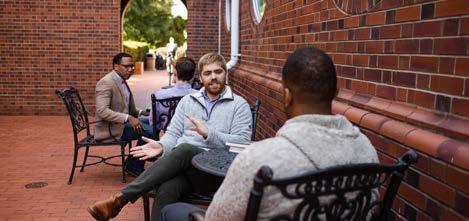
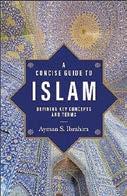 Jeremy Pierre
Jeremy Pierre
 Timothy Paul Jones
Timothy Paul Jones

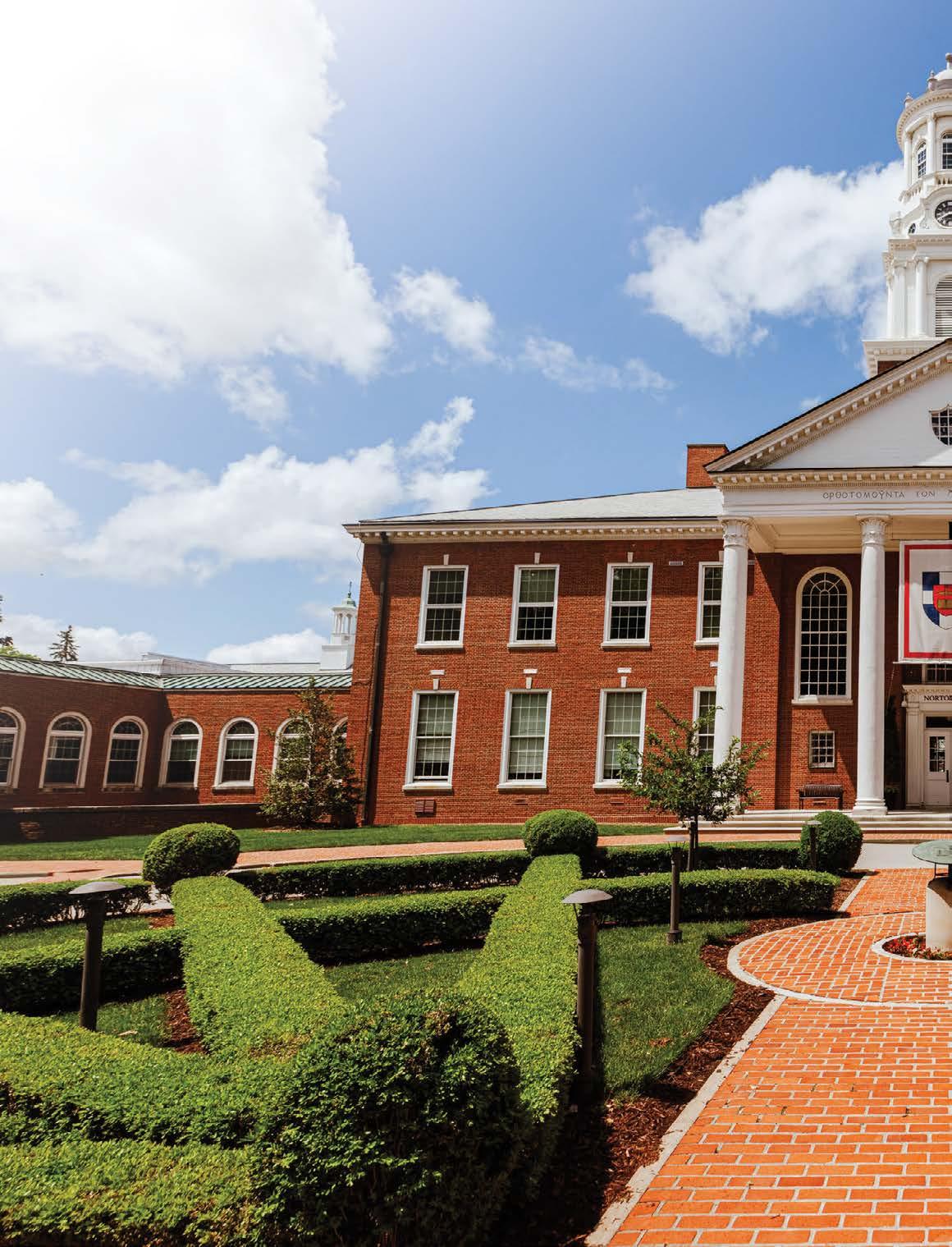
that can be organized into graduate certificates, allowing you to specialize and earn additional credentials PERSONALIZED 21 credit hours of electives

Residential MDiv students now pay for only the first 9 hours per semester and can take an additional 2 classes per semester for FREE INCENTIVIZED 40% Save up to by studying in Louisville

Rejoice with those who rejoice, weep with those who weep.
Live in harmony with one another.
Do not be haughty, but associate with the lowly.
Never be wise in your own sight.
ROMANS 12:15–16 ESV
No one prepares you for how strange ministry is. How could they? To be strange is to be unexpected, odd, out of the norm. And personal ministry in particular traffics in the unknowns. It occurs at the heart of strange.
This insight came to me one afternoon as I sat in my church office, listening to a man walk me through his interpretation of a billboard for All State Insurance as a sign from God instructing him to marry a woman who was
already married to another man. This was not exactly seminary course material. Strange.
When you’re personally ministering the Word to real people, you get their real problems. A leader in the college ministry suddenly starts promoting furries’ rights online. (If you don’t know what that means, the Lord bless and keep you.) Or, you catch wind that a professional in his fifties is letting people know at church that he’ll be marrying a woman in her early twenties that no one has ever met. Or, a husband and wife inform you that she is pregnant but they haven’t slept together in over a year, and you have to untangle that story before you even know what action to take. Strange.
Let me get to the point I’m driving at.
PERSONAL MINISTRY MEANS FACING THE UNKNOWNS OF YOUR PEOPLE’S TROUBLE WHILE ATTENDING TO WHAT YOU DO KNOW FROM THE WORD. Sometimes this will make you cry. Sometimes laugh. Sometimes throw your hands up. But all the time pray.
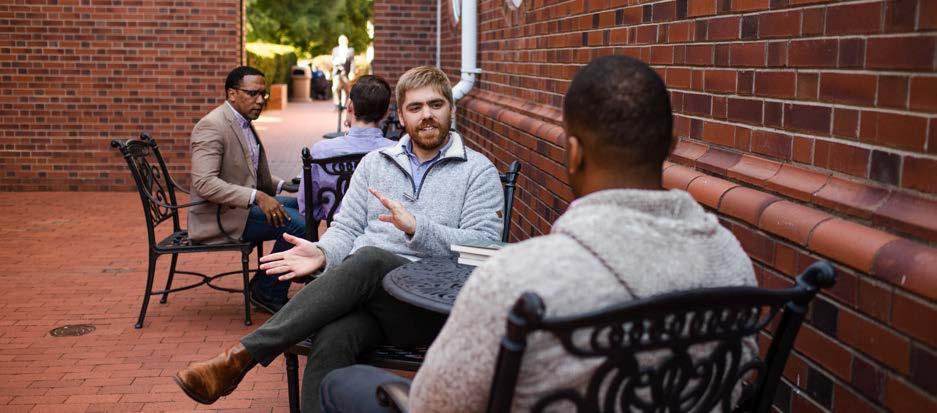
Being with Your People in the Unknowns
What makes personal ministry so much stranger than public ministry are the variables. In public ministry, you study your text of Scripture and the history of interpretation. You create your sermon or lesson outline, thinking about general applications to folks in your church and community. But most things in public ministry are planned and delivered. Personal ministry to individuals is full of unknown variables. That’s what makes it so unpredictable and often strange. We don’t like the idea of entering into situations we’re not familiar with, of placing ourselves in conversations we don’t know the way out of. If you feel lost in a sermon or lesson you’re giving to a group, that’s a simple mistake in preparation. But in a personal conversation, there is no preparation that can entirely prevent you from feeling a bit lost at times. In personal ministry, unknown variables are the norm.
But let me relieve some of the burden of this for you. Knowing the route through those
unknowns is less important than being present with your people in the unknowns. In other words, you enter into the confusion with them, not as the one responsible to have pre-supplied answers but as one who sits with them to wait on the Lord.
Presence. This is one of the greatest tools for ministry we have. Presence is facing unknowns together. I’m talking about something more than just being in the room. It’s not just passively receiving information. I’m talking active presence, where we voluntarily shoulder their questions and concerns with them, in all their majestic strangeness, and go before the Lord.
This is why I made Romans 12:15-16 the epigraph to this article. To weep with those who weep or rejoice with those who rejoice means you’re affected by what affects them, you’re an active participant in the variables that affect them. The instruction of these verses presumes the ability to recognize the state people are in and respond appropriately.
It also presumes a willingness to take on troubles (and joys) that are not your own.
This takes time and effort. And it takes a certain degree of fortitude. Honestly, you have to be strong for this kind of ministry. You have to be strong in a way that public ministry doesn’t require as much. It’s a strength characterized both by contentment that God knows what you don’t know and by confidence that God will reveal what needs to be known for proper response at each stage. To put it simply, you have to get comfortable with waiting on God for answers.
Sometimes, there’s incredible clarity in a simple declarative sentence, like the one in James 4:14: “You do not know what tomorrow will bring.” The whole point James is driving at is that it is the Lord’s will that brings the variables of each day. God wants the humility of our recognizing that he alone knows all the variables involved in our success and our suffering. As we minister to people, we model for them what confidence in the unknowns looks like by attending to God’s Word. This is the same letter that starts out, “If any of you lacks wisdom, let him ask God, who gives generously to all without reproach, and it will be given him” (1:5). Incredible clarity.
How does God grant this wisdom? I use the word “attending” deliberately. Attending means waiting. Attending is not a passive waiting; it is active attention to the means by which God grants wisdom to face the unexpected. We attend to the Word as an act of submission to God. We ask the Holy Spirit
to prepare our hearts to receive this wisdom to see the specific troubles people face with greater clarity.
This desire is expressed beautifully in Psalm 130:5: “I wait for the Lord, my souls waits, and in his word I hope; my soul waits for the Lord more than watchmen for the morning, more than watchmen for the morning.”
What your people need from you is not an immediate answer to all the specifics of their troubles but a confident attendance to God’s Word with them regarding their troubles.
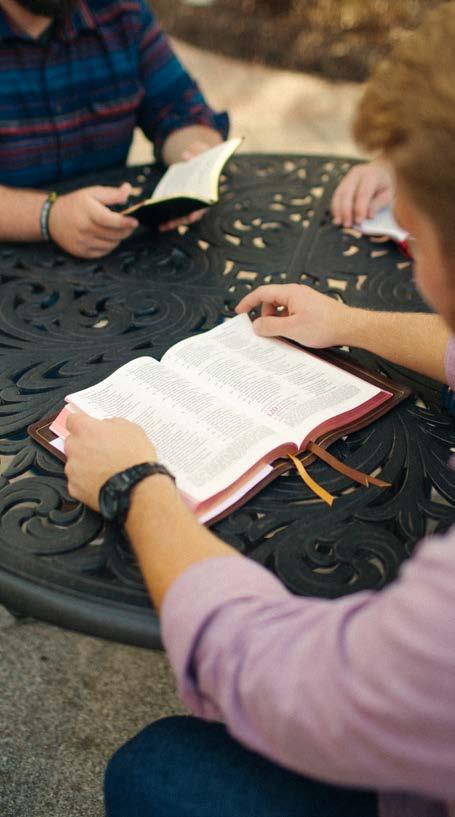

This avoids two opposing temptations: either to get lost in trying to figure out all the specifics or to ignore the specifics because they’re so confusing. Instead, attendance to the Word means that you’re willing to wait on the Lord regarding the unknowns while you trust and obey the knowns.
Figuring out what furries are and to what degree your college ministry leader is associating with them will take time. Discovering why this guy in his fifties is drawn toward this particular young lady, how they have conducted themselves in the relationship, and what accountability looks like in this situation will take effort. Sorting through the obvious sin that occurred when a wife is impregnated by another man with the less obvious relational history and motivations that led to that sin will be complex. Those unknowns are daunting. But Scripture is full of knowns. And they provide the grace of clarity for each step.
To know which knowns are most relevant, you have to know your Bible. And that will be my parting encouragement. I’ve already made it clear you can’t entirely prepare for the unexpected. That’s what makes personal ministry strange. But you can be prepared to respond wisely to the strange and unexpected by stockpiling wisdom from the Word over the course of your ministry. Know the God of Scripture, and you will know his heart in each situation.
Strange, I know. But look at all the strange situations Paul wrote to in the early church or Jesus walked into when he entered a town. The world of ministry has always been strange. But we can confidently wade into the unknowns precisely because God has made known everything we need to wait on him.

"What your people need from you is not an immediate answer to all the specifics of their troubles but a confident attendance to God’s Word with them regarding their troubles."
J EREMY P IERRE

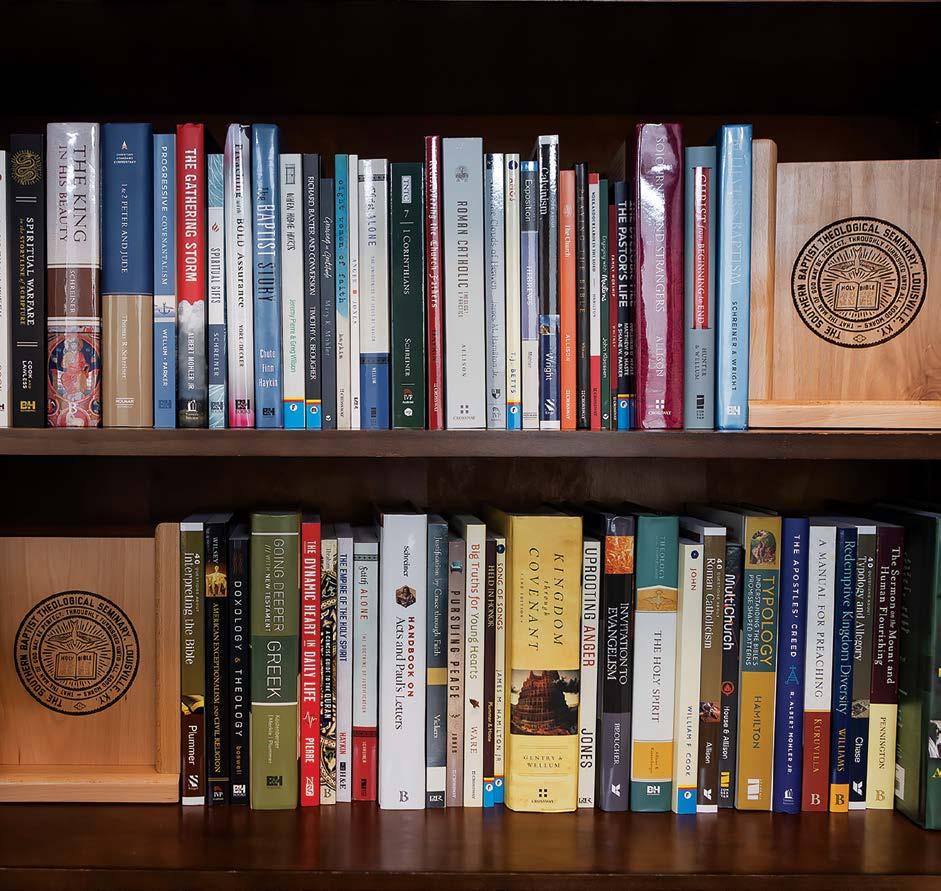
Visit the Bookstore at Southern, the largest theological bookstore in North America. From biblical commentaries to church history, we have everything you need to deepen your love of God and his Word and build your library. Our collections range from the newest releases to an extensive collection of high-quality used books!

Life and ministry have changed rapidly and radically over the past forty years.
Reared in a pastor’s home, I was not, on the one hand, totally unprepared for the complexities and complications that awaited me when I accepted my first full-time ministry assignment at only twenty years old. On the other hand, no one was prepared for the sweeping changes that the next four decades would produce. Five things, in particular, caught me completely unprepared and added challenges to life and ministry that I never saw coming but nonetheless to which I had to respond.
When I was a boy, I spent a lot of time alone with older men who were members of churches my father served as pastor. They
taught me to work hard, hunt stealthily, fish patiently, accurately identify plants and trees in the woods, and drive almost anything. None of them ever acted inappropriately or abused me in any way. They were kind, godly men who helped me walk toward manhood. Each of them proved worthy of the trust my parents placed in them. That idyllic childhood hardly prepared me for the hidden crimes and abuses perpetrated in many churches that would later be widely exposed and reckoned with.
Consequently, ministry today means thinking about physical safety issues and the price paid when that does not happen. Not only are churches now endeavoring to help those hurt in the past, but they also must do everything possible to prevent any crimes or even potential for such deeds in the future.
I did not foresee a need to run background checks on all church employees, leaders, and volunteer workers, but we do. Nor did I realize how much the physical security of church members and employees would factor into the design and expense of a new building, but it did. For the first half of my ministry, I never thought of lockdowns, active shooters, armed and uniformed officers in the church building, security cameras, or a policy that no adult may ever be alone with a child, but I certainly have in the last two decades. Like many others, I needed education and training to know how to protect the people whom I lead. That often meant hearing hard truths about consequences when churches and shepherds are not vigilant, stories so grievous that they made me resolve to do everything I could so it did not happen on my watch.
I remember when the public relations agenda of the gay lobby could be summed up in the word “tolerance.” They claimed that all they wanted was to be allowed to live their lives as they saw fit. No one asks for “tolerance” anymore. The demand now has moved beyond acquiescence or acceptance to full agreement and celebration.
Not only did the vocabulary of the demand changed, but so did the coalition of those demanding it. The “gay lobby” became LGBTQIA+, and the + means so many things that it’s impossible to keep up: twospirit, non-binary, pansexual, demisexual, aromantic, gender fluid, and asexual! Who saw that coming? Not I. But the most
troubling thing is that neither did I anticipate that people who have claimed to be Biblebelieving Christians for years would abandon clear biblical precepts to accept the views perpetrated on them by the contemporary culture. I did not foresee Christian colleges and universities abandoning the clear moral standards of their past and raising a white flag of surrender followed by a rainbow flag of assimilation. I could not have believed that parents would be led by their indoctrinated children on this issue rather than the other way round. I correctly assumed the world would gradually accept homosexuality, but I never imagined a wholesale denial of gender reality. Some people have always argued that they should be allowed to dress and to live however they wanted, but I could not have known that much of the world would vociferously argue that genes and genitalia do not determine sex, that men can have babies, that gender can be fluid, that people have the right to force others to use certain pronouns, or that biological men can compete in women’s sports. I never foresaw that a female nominee for the Supreme Court of the United States would be unable or unwilling—under oath—to define what a woman is.
In the entire history of the world, no previous culture has been confused on this issue. Whether pagan or Christian, rural or urban, ancient or modern, everyone has known how to finish the sentence uttered at the birth of a healthy baby, “It’s a . . . .” I did not envisage that our culture would have the hubris to look back in smug judgment on all others and simply say, “We know better.”
My parents’ generation complained frequently about their kids’ being glued to the television. They had no idea that screens would morph and proliferate into every room, every space, and every waking moment in the lives of their grandchildren and great-grandchildren. No one foresaw that those ubiquitous screens could simultaneously bring information and inanity, delight and danger, gospel preaching and graphic pornography. No one knew that the self-image and mental health of teens would be shaped—and threatened—by the things they saw on those screens.
Opinions on everything from sex and sexuality to Christian nationalism to fashion to theology to politics and public discourse are formed largely from online exposure. Out of the same screen come praise and cursing. I don’t think I am doing the biblical writer James a disservice by applying his statement on the tongue to our screens: “My brothers, these things ought not to be so” (James 3:10 ESV).

Screens on computers, iPads, cell phones, and TVs are relentlessly streaming values, opinions, worldviews, and images into the minds of believers and unbelievers alike at an informational rate many times over anything in the past. Parents are giving their children easy access to the internet and, consequently, giving everything on the internet easy access to their children. And parents are being manipulated and molded by those same forces as much as their children.
Christian ministries and churches have tried to use those screens for gospel purposes and have succeeded in many ways. Still, biblical truth proclaimed on the internet is—to paraphrase the great R. G. Lee—“like a fragrant gardenia in a garbage dump.” I had no idea how much of my time in ministry would be spent dealing with people discipled destructively by a screen.
I had read books or watched movies about what a global pandemic might look like, but I had never thought about what it might mean to lead a church through one. I did not see it coming, and when I did, I did not think it would last long. When it lasted long, I still held out the hope, even the belief, that an end point would come at which everything reverted to what it was before I ever heard of COVID-19. I know now that will never happen. The world changed in ways we can neither undo nor move past.
I thought the biggest problems of a pandemic would be health issues, but for me, at least, the leadership challenges were far more challenging than the three times I contracted COVID. How could I lead a church when
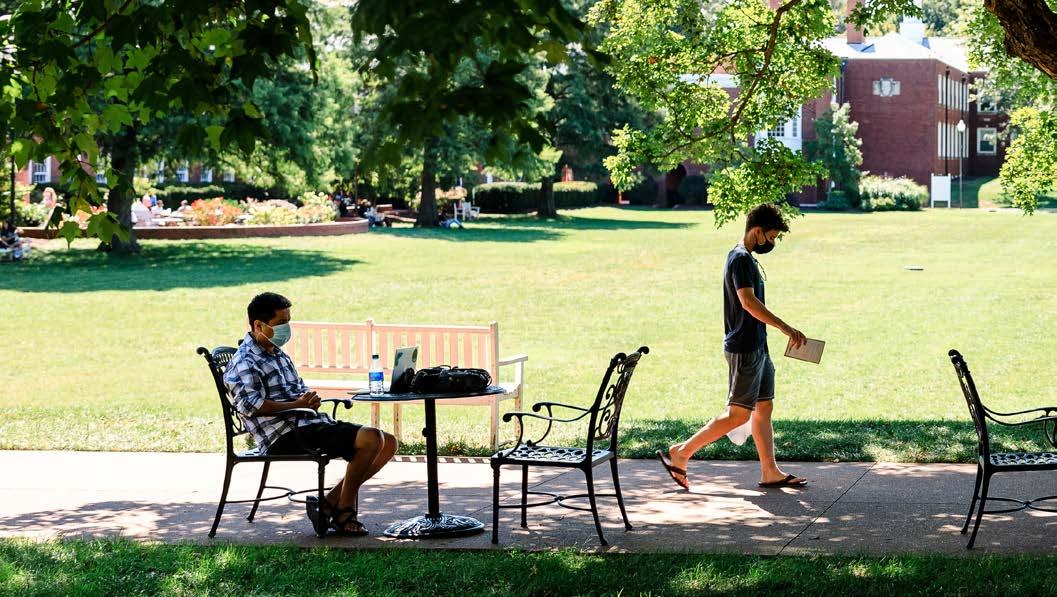
we couldn’t gather? How could we maintain unity in a world so fractured? How could the voice of a shepherd be heard above the din of everything else the sheep were seeing and listening to online? I had always trusted my ability to look my members in the eye and speak candidly and honestly so that they gave me their trust. I never thought about how I would lead when I couldn’t even be with them for a while or have them all together, even when we came back in multiple services. I also didn’t know that the members of my church would have such different opinions about the social and medical issues the pandemic brought.
Though the pandemic ended, many effects remain. Some church members simply disappeared, and we don’t know where they went or what happened to them. Some never came back and say they are no longer
following Christ. Habits and expectations changed. I am grateful our church made it through the pandemic without major divisions or disruptions, but it was hard, and it made me develop a different set of skills than those I relied on before.
I can name numerous evangelical leaders who shared platforms and enjoyed close fellowship ten years ago but hardly speak to each other now. Historically, theology has been the basis of Christian fellowships and denominations, but in recent years, theological distinctives have given way to myriad other issues that previously were secondary or non-existent.
Christians don’t merely disagree about theology or the best way to be Christian in
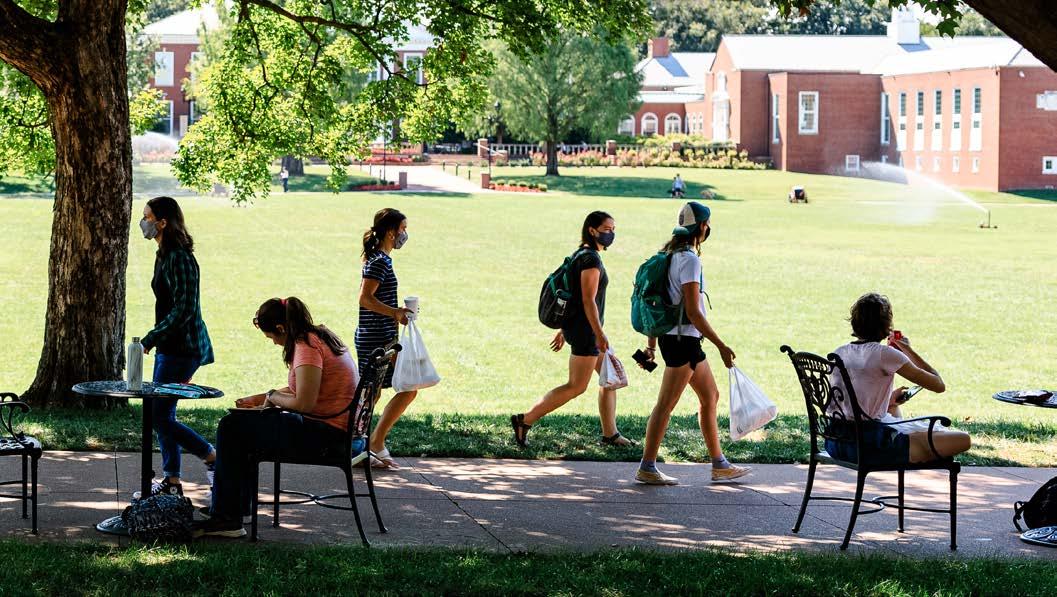
a multicultural, pluralist society. They argue about politics, vaccines, the war in Ukraine, race, and a host of other matters that, though important, were once left out of church spaces. Those disagreements lead to suspicions of a departure from faithfulness and fidelity. Those suspicions, in turn, embolden public accusations and personal animus, including labels intended to demean and dismiss someone over a single issue. Fellowship has fractured over non-theological issues like never before in my lifetime. And if that is true on the broad spectrum of evangelicalism, it is equally true in local churches.
Social media provides a public platform for everyone, and Christian charity is often the first casualty when an indignant believer feels justified in publicly correcting or calling out someone. The more outrageously the outrage is expressed, the more hits or views
it generates. I confess that I did not anticipate this degree of animosity among believers, particularly between well-known leaders.
While I must admit a lack of foresight and being completely shocked by these major developments over the course of my ministry, one thing I saw very clearly, and which has only been confirmed across decades of experience, is this: the gospel of Jesus Christ is true. I have frequently been disappointed by people, even more so in myself, but Jesus has never let me down. Through all the sadness, confusion, disappointment, misinformation, and animosity around me, I still know that the gospel is the deepest need to the greatest problem in the world. I am more determined than ever to believe it, preach it, tell it, trust it, and live it than ever before—no matter what comes next.

Southern Seminary offers you theologically informed training in counseling faithfully and the ability to earn a Graduate Certificate in Biblical Counseling.

"Through
all the sadness, confusion, disappointment, misinformation, and animosity around me, I still know that the gospel is the deepest need to the greatest problem in the world. I am more determined than ever to believe it, preach it, tell it, trust it, and live it than ever before— no matter what comes next."
H ERSHAEL W. YORK
Pastoral leadership is inseparable from the image of a shepherd. The word “pastor” is, after all, the Latin word for “shepherd.” The call to serve as a pastor or elder is a call to shepherd the people of God in a particular place (Acts 20:28–29; Eph. 4:11; 1 Pet. 5:1–2). AS I READ THE SCRIPTURES, I SEE THREE KEY PRACTICES OF A SHEPHERD LEADER THAT REMIND ME HOW TO RELATE TO THE PEOPLE FOR WHOM I AM RESPONSIBLE AS A PASTOR.
A shepherd leader is a leader who practices presence, protection, and provision. These three practices are particularly clear in God’s denial of David’s request to build a temple (2 Sam. 7). After rejecting David’s plan, God
related the ways that he had shepherded David throughout his rise to power:
The Lord had remained present with David (“I have been with you,” 7:9).
The Lord had protected David (“I have destroyed all your enemies,” 7:9).
The Lord promised to provide a name for David and a place for the people of Israel (“I will make a name for you. . . . I will establish a place,” 7:9–10).
This threefold description of God’s care for David provides a helpful snapshot of the practices of an ideal shepherd: Shepherds remain with the sheep, rescue them from danger, and provide them with a place where they receive what they need to be secure. In other words, shepherds practice presence,
protection, and provision. One result of God’s shepherding would be peace for David and for his people (“so that they may . . . not be disturbed. . . . I will give you rest,” 7:10–11). If any future king of Israel became a beast who preyed on the people, God would discipline this king with a shepherd’s rod (7:14).
This covenant with David is far from the last place where provision, presence, and protection appear in connection with sheep and shepherds, however. In his most famous psalm, David recognized the Lord as his shepherd (Ps. 23:1). According to David, his shepherd God was:
Present to guide him (“he leads me,” “you are with me,” 23:3–4)
Powerful to protect him
(“I fear no danger,” “in the presence of my enemies,” 23:4–5; see also Ps. 28:7–9)
Faithful to provide for him
(“there is nothing I lack,” “green pastures,” “quiet waters,” “he prepares a table,” 23:1–2, 5)
Once again, the leadership of the Lord God led to peace and rest in a place that God himself had prepared (“he lets me lie down,” “I will dwell in the house of the Lord,” 23:2, 6).
Practices of presence, protection, and provision are entwined in descriptions of the ideal shepherd in Scripture because no sheep can survive long without a shepherd who is present, powerful, and faithful to provide. Without antlers or claws or fangs, sheep are hard pressed to strike back at predators. Lacking the capacity to climb or to run at high speeds, they can’t escape easily
either. Simply put, an independent sheep is a dead sheep.
Because they are so vulnerable, sheep don’t typically rest unless they feel safe and secure. In the words of Timothy Laniak, for sheep “rest is not only a function of being well provided for. It is a state of security that comes from the shepherd’s protective presence.”1 This is why God called for leaders who would not only lead his people but also shepherd them. Every sheep needs a shepherd and a flock.
When God raised up human leaders as shepherds, he was calling them to participate in his work of rescuing his people, remaining with them, and providing for them. This calling did not elevate leaders to positions of sovereign lordship over the people; instead, it placed them in positions of sacrificial stewardship among the people of Israel. God alone remained the supreme shepherd of his people, because only a sovereign God is capable of perfect provision, protection, and presence (Ps. 80:1; Isa. 40:11; Jer. 31:10; Mic. 7:14). The position of the God-called shepherd leader is one of service and obedience, guiding and guarding the people under the authority of the supreme shepherd. In the early church, this way of leading would become so closely tied to the work of the church’s leaders that the word “pastor”— which means “shepherd”—developed into a title for the office of elders and overseers in the new covenant.

To be a shepherd leader requires us to be present with our people, protecting them from error and providing them with the rich fodder of God’s Word. In the world’s way of thinking, successful leadership correlates with inaccessibility; the most successful leaders are protected by layers of security, staff, and secretaries. Unfortunately, church leaders can easily fall into similar patterns. Among pastors, however, such inaccessibility should be seen not as a badge of honor but as a shameful signpost of capitulation to the world’s values. We cannot be present with our people to protect and provide for them if we aren’t accessible to them. If shepherds cease to be available to the sheep, they cease to behave as shepherds. This is not to suggest that a pastor must be leashed to every member’s passing whim or present at every church function. Pastors must schedule consistent times for the purposes of study, prayer, and spiritual refreshment (Luke 5:16; Acts 6:2, 4), as well as making space for rest and recreation and time for family. And yet pastors must also prioritize patterns of presence with their flock.
When it comes to provision and protection, the world’s priorities might call us to pay the most attention to the people who are most powerful, or those whose bank accounts are most likely to multiply the church’s budget. Godly shepherds, however, are called to provide and to protect by seeking the lost, bringing back the strays, bandaging the injured, and strengthening the weak (Ezek. 34:16)—which sounds like a shepherd’s priorities should be shaped not by people’s positions, but by their brokenness and need. “If I do not show concern for the one sheep that strays and gets lost,” Augustine remarked in the fifth century regarding his congregation in the city of Hippo, “even a sheep who is strong will think it’s nothing more than a joke to stray and to be lost. I do indeed desire outward gains, but I’m more afraid of inward losses.” 2
1 Timothy Laniak, Shepherds after My Own Heart (Downers Grove, IL: InterVarsity, 2006), 55.
2 Augustine of Hippo, “Sermon 46: On the Shepherds,” in Sermons 20-50, vol. 2 of The Works of Saint Augustine, pt. 3, Sermons, trans. Edmund Hill, ed. John E. Rotelle (Brooklyn: New City Press, 1990), 272.

Ever since he empowered his people through his Spirit, Jesus the good shepherd has been gathering a flock from every nation and making them his own (Matt 28:19; John 10:14-18). As he gathers this flock, God has chosen not only to serve as the supreme shepherd of his people, but also to work through human shepherds. In the Gospels, the apostles began as sheep (Matt 10:16) and became shepherds (John 21:15-18) who then recognized other God-appointed leaders as shepherds of the flock (Eph. 4:11; 1 Pet. 5:1-2). And yet, those who are privileged to shepherd God’s people are never lords over the flock; we are followers of a greater shepherd who alone remains the true owner of the sheep (Heb. 13:20; 1 Pet. 2:25; 5:4). Our calling is to pursue the pattern of Jesus, the model shepherd. When we pursue the pattern of Jesus, our lives are characterized by habits of presence, protection, and provision for the men and women in our churches.
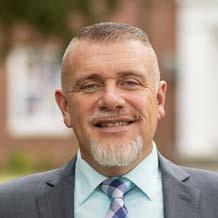
"The position of the God-called shepherd leader is one of service and obedience, guiding and guarding the people under the authority of the supreme shepherd."
T IMOTHY PAUL J ONES

On my first visit to Southern Seminary, I thought, "This library is worn." The floors were worn. The desks were worn. The books were worn. The campus, professors, and legacy were top notch, but the library . . . underwhelming. My perspective has since changed. If I had voiced my impression of a worn library to James Petigru Boyce he would have responded, "Yes, as it should be." Tattered floors and desks revealed that the faithful and educated ministers Boyce envisioned to lead Southern Baptists shared his convictions.
Thus, the story of the library at Southern Seminary begins with Boyce—in spirit and flesh. He provided the Seminary with books, many of which remain today, and a love for books that Lordwilling, will endure for the life of this institution.
According to historian Gregory A. Wills, it is not an overstatement to say that "Boyce's love and admiration for books of all kinds is embedded into the character of Southern Seminary."
Boyce wrote in 1856 that “no institution can pursue extensive courses of study or contribute anything directly to the advancement of learning,” without a “good theological library.” Those closest to Boyce couldn’t separate the man from his books. “His library was a source of great pride and enjoyment," his daughter wrote.
“From early childhood, James was an excessive reader,” professor and friend John Broadus wrote. “While his companions were in the ‘city square’ or on the ‘citadel green,’ engaged in their physical sports, he would be lying flat on the ‘joggling-board’ in his father’s piazza absorbed in some storybook, novel, or history” (A joggling-board was a bench a child could rock on). Broadus noted that the more Boyce read, the more his “voraciousness” and “number and variety of books he read” increased. “All through life,” wrote Broadus, Boyce’s admiration for reading was “a marvel to his family and intimate friends.” Boyce rarely went to town without scavenging through bookstores, and he always bought his theological books with the seminary in mind.
Plans for the seminary came to fruition in 1859, and the library would serve Boyce’s vision for theological education. He believed students at every level of education needed training, the curriculum
should permit advanced scholarship for the ablest students, and a biblical confession of faith should determine the boundaries of acceptable belief among the faculty. At the 1858 Southern Baptist Convention, South Carolina pastor Thomas Curtis echoed the importance of a world-class library. “The requisites for an institution of learning are three b’s,—bricks, books, brains,” Curtis wrote. “Our brethren usually begin at the wrong end of the three b’s; they spend all their money for bricks, have nothing to buy books, and must take such brains as they can pick up. But our brethren ought to begin at the other end of the three b’s.”
From 1859 to 1877, Southern Seminary made its home in the former meeting house of the First Baptist Church in Greenville, erected in 1826. The Greenville building had two lecture rooms and a library, totaling 1,100 square feet.
Furman University donated two thousand volumes of its theological collection to begin the library. One of Boyce’s former teachers, William E. Bailey, then donated many of his classical works to the seminary in 1859. Broadus wrote that Bailey’s collection of 1,300 works included “many elaborate and costly editions of the great classical authors”—a good start for the first student body of seven students. The following
summer, Columbian College of Washington City provided two hundred more volumes which included highly valuable complete sets. The books were stored in glass cabinets and numbered according to the shelf.
However, building a library is never final. Boyce and Broadus consistently corresponded with one another regarding the purchase of books for the library. As they traveled to New York (the most important hub for book purchasing), the two friends and professors labored to make sure they could fill the library with the latest scholarship as well as cultureshaping classical works of literature, philosophy, history, and theology.
“Three Professors and a Few Thousand Volumes”: From Greenville to Louisville
On the brink of financial ruin and facing the threat of closure, Boyce resorted to moving the seminary to Louisville, Kentucky in 1877. Broadus wrote that the move would not be difficult because “there was nothing to move, except the library of a few thousand volumes, and three professors—Broadus, Toy, and Whitsitt—only one of whom had a family.”
The seminary rented space in Louisville from the Free Public Library on the third and fourth floors. The library filled the fourth floor, and the third story housed the lecture rooms.
The actual movement of the books included the efforts of students, professors, and their families. Annie Broadus, daughter of John A. Broadus, wrote that a couple of students had worked all day for a whole week boxing
Toy’s books—and a week of work remained. Books were numbered by box, and the packing process was expected to take at least a month for the seminary library.
The boxed books, about seventhousand volumes, were shipped by train. Around the same time, the faculty requested a list of all the periodicals and planned to draw up a list of rules. The rules contained strict instructions for checking out material and gave credence to the claims that librarians of the past were known as “shushers.”
Southern Seminary erected the beautiful Memorial Library in May of 1890 at the corner of Fifth and Broadway in downtown Louisville. Broadus wrote that the building “was carefully planned according to the best recent ideas and examples, and is one of the most beautiful, convenient, and every way satisfactory library buildings in
existence.” He added that it would hold sixty-thousand volumes and provide plenty of space to expand.
But how did the struggling seminary construct such a spectacular home for its growing collection?
In 1888, Mrs. J. Lawrence Smith surprised the faculty with a gift of $50,000 to build and furnish a library to advance the gospel as one of the “great needs of humanity.” Smith previously contributed to the seminary but wanted the new library to honor her deceased nieces and nephews: Sara Julia Caperton, Mary Caperton, William Beverly Caldwell Jr., and Lawrence Smith Caldwell. Smith was the widow of J. Lawrence Smith, who charitably gave to many ministerial causes in Louisville but had opposed Boyce moving the Seminary to Louisville out of fear that the learned pastors of the seminary would overrun the Kentucky pastors. Mrs. Smith wrote to the faculty that the seminary needed a permanent
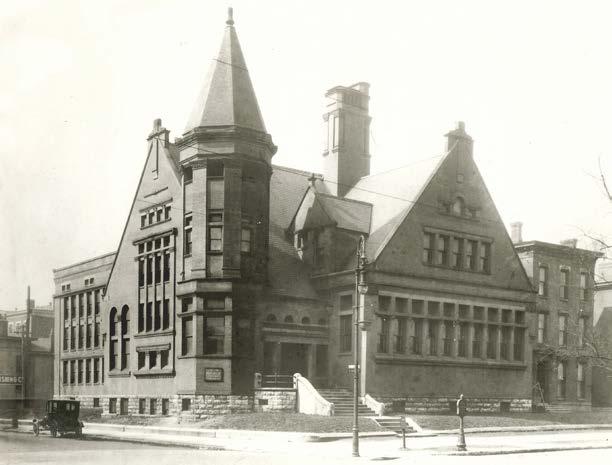
location for its books and that students needed “to study the Bible with all its helps.”
Boyce celebrated the gift as the provision of God and envisioned a library that would last for 100 years. He died shortly after he learned of Mrs. Lawrence’s gift on December 28, 1888. According to Broadus, 5,000 volumes of Boyce’s collection went to the library. “It is proper to state that his wishes in this regard were of course very carefully carried out,” Broadus said.
“Some persons have wondered that Dr. Boyce’s noble collection was not kept separate. Yet his older colleagues were quite sure that he would himself have chosen to have his books distributed throughout the library, according to subjects. Separate collections may be a pleasing memorial, but in that way the books are not worth half so much for actual use.”
Never again could Boyce’s library be distinguished from Southern Seminary’s library.
Beeches, Boyce Centennial, and Billy Graham
Southern Seminary moved to its present location on Lexington Road in 1926. By the time of the move to “the Beeches,” as the new location came to be known, the collection had grown to 51,000 volumes. The library stacks stood in the far east end of Norton Hall, in what today is Norton 195. The room, currently called Broadus Chapel, housed the desks, circulation, and reading areas.
By the 1950s, the collection grew to nearly 140,000 volumes, and the enrollment spiked to 1,700 students. The facilities could not keep up. Seminary staff, including

President Duke McCall, began pushing for a new library building in 1951. McCall envisioned opening the James P. Boyce Centennial Library in 1959 to celebrate the school’s hundred-year anniversary.
A committee introduced a threeyear strategy to raise $500,000 for the new library from 1957–1959.
Southern Seminary leaders toured libraries nationwide for inspiration. After much consultation, the new library would model the library at Florida State University. Librarian Leo T. Crismon recalled, "That library impressed us more than any of the others."
President McCall joined Crismon and others to finally break ground on the Boyce Centennial Library on May 24, 1957. After a few unexpected hoops and hurdles, such as heavy rain and busting steam pipes, builders completed the library, but costs exceeded the initial plan. The school had
to borrow over $20,000 from the Executive Committee, but the alumni pledges surpassed the goal by 1960 and raised $528,067. The seminary officially dedicated the state-of-the-art Boyce Centennial Library on March 10, 1960. Billy Graham arrived on campus in May and donated artifacts for the "Billy Graham Room."
During a round of golf in 1956, President McCall had convinced Graham to donate his crusade material to Southern Seminary instead of Harvard University. At the dedication, Graham said that his team donated the materials for three purposes: the glory of God, the study of mass evangelism, and to provide inspiration and interest in evangelism. “Research and facilities for research will bring about a continual interest in mass evangelism for years to come,” Graham said. “It is our prayer that this deposit of material might be of inspiration and challenge to

students and generations to come. That they may see that the message of the first century has been used effectively in the twentieth century and that people have listened, representing many languages and all races.” Graham then presented his first Bible to President McCall.
The library stood complete and dedicated, but what about the books?
“We decided that we would use the students, as many of them who would volunteer,” Crismon said. “We would start with the zeroes and then go to the one hundreds and the two-hundreds in the Dewey decimal classifications, take them out of the old library building, carry them in to the main door and onto the main floor.” The first book shelved was Boyce’s personal copy of the Geneva Bible.
The Southern Baptist Convention experienced decades of turbulence during the so-called “conservative
takeover” in the late 1970s through the early 1990s. The convention garnered grassroots support to appoint conservative presidents, trustees, and, in 1993, the youngest seminary president in the history of the convention. When R. Albert Mohler Jr. became president, “there were no neutral spaces,” Wills said. “The depth of concern and pain was too deep on both sides.” Even
the library failed to escape the grip of controversy.
“Very naturally, the progressive character of the faculty built the library on progressive commitments,” Wills said. “The acquisition policy under Mohler changed to include conservative presses and scholarship.” In other words, the Seminary broadened its collection of resources rather than shifting from progressive to conservative material.
Tradition and change coalesce in libraries. Collections grow older, but technology evolves. The initial classification of books only referenced a shelf and book number, but John R. Sampey, the fifth president of Southern Seminary, introduced the Dewey Decimal system in 1890. The system stood until 2007 when the library adopted the Library of Congress classification. The relabeling process was finalized in 2012.
Before Wills assumed the role as the first full-time archivist
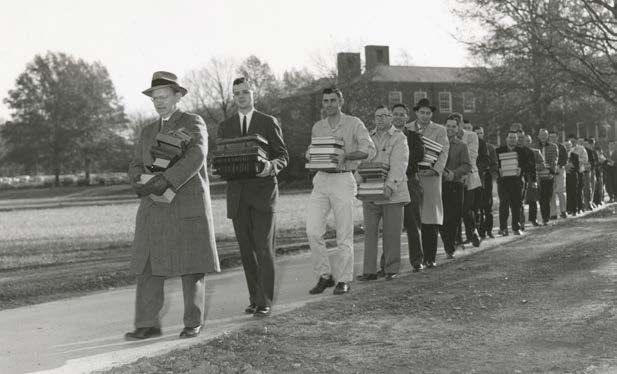 James P. Boyce Centennial Library
James P. Boyce Centennial Library
in 1994, the library had begun cataloging and indexing archived material with part-time workers and volunteers. The process started in 1975. At the same time, the seminary was changing from a card catalog to an online database that could be searchable around the world.
Martha Powell, who joined the library staff in 1969 and continues to volunteer her time today, said “this meant entering information about each item the library owned and putting a barcode on each item. We started entering information into the database in 1970 and library employees are still doing it today." Another significant change the library witnessed was the increased need for digital resources, a task Southern Seminary “adapted fluidly to” in the twentieth century, according to the current librarian, Berry Driver.
There remained one problem. The desks and floors really were worn. Three previous renovation plans emerged in the last twenty years under the administrations of Ronald Deering, Bruce Keisling, and Driver. Finally, in 2022, the plans culminated with the current renovation and the library re-opened on August 29, 2023.
Current Chairman of the Board of Trustees, Joshua W. Powell, said the library exists so that students and faculty “may pursue dedicated study for the glory of God and the advancement of his kingdom.”
The vision and character of Boyce live on in the library indebted to his name, efforts, collections, and spirit.
The library of the Southern Baptist Theological Seminary has always been Boyce’s library.


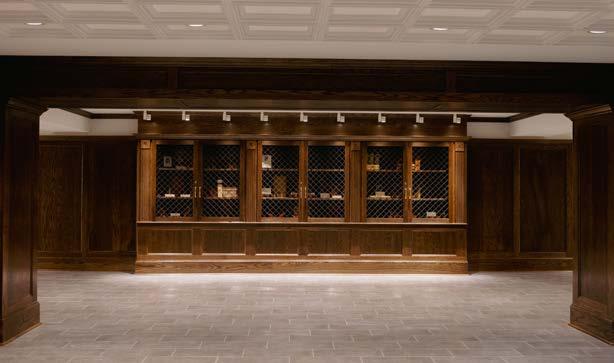
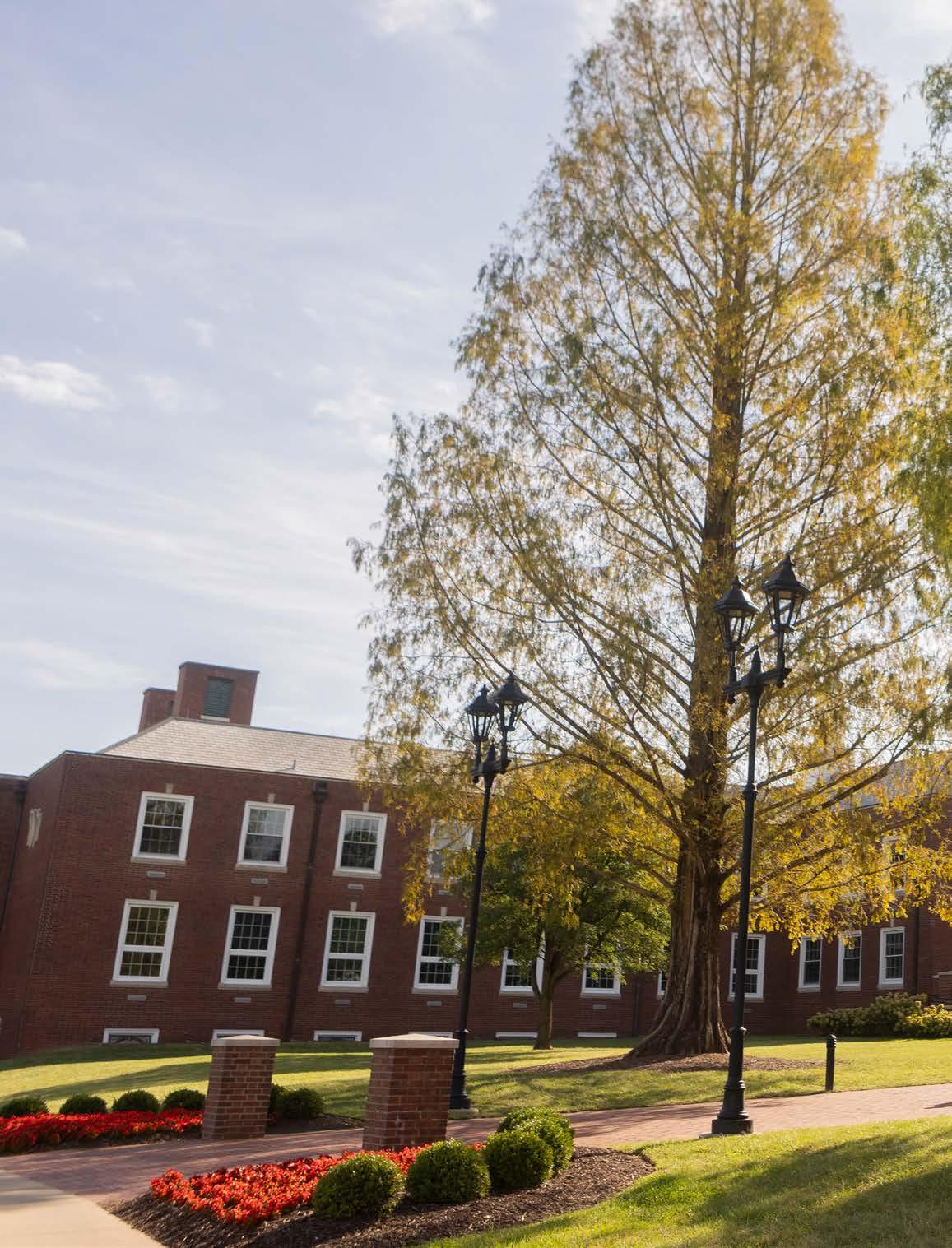
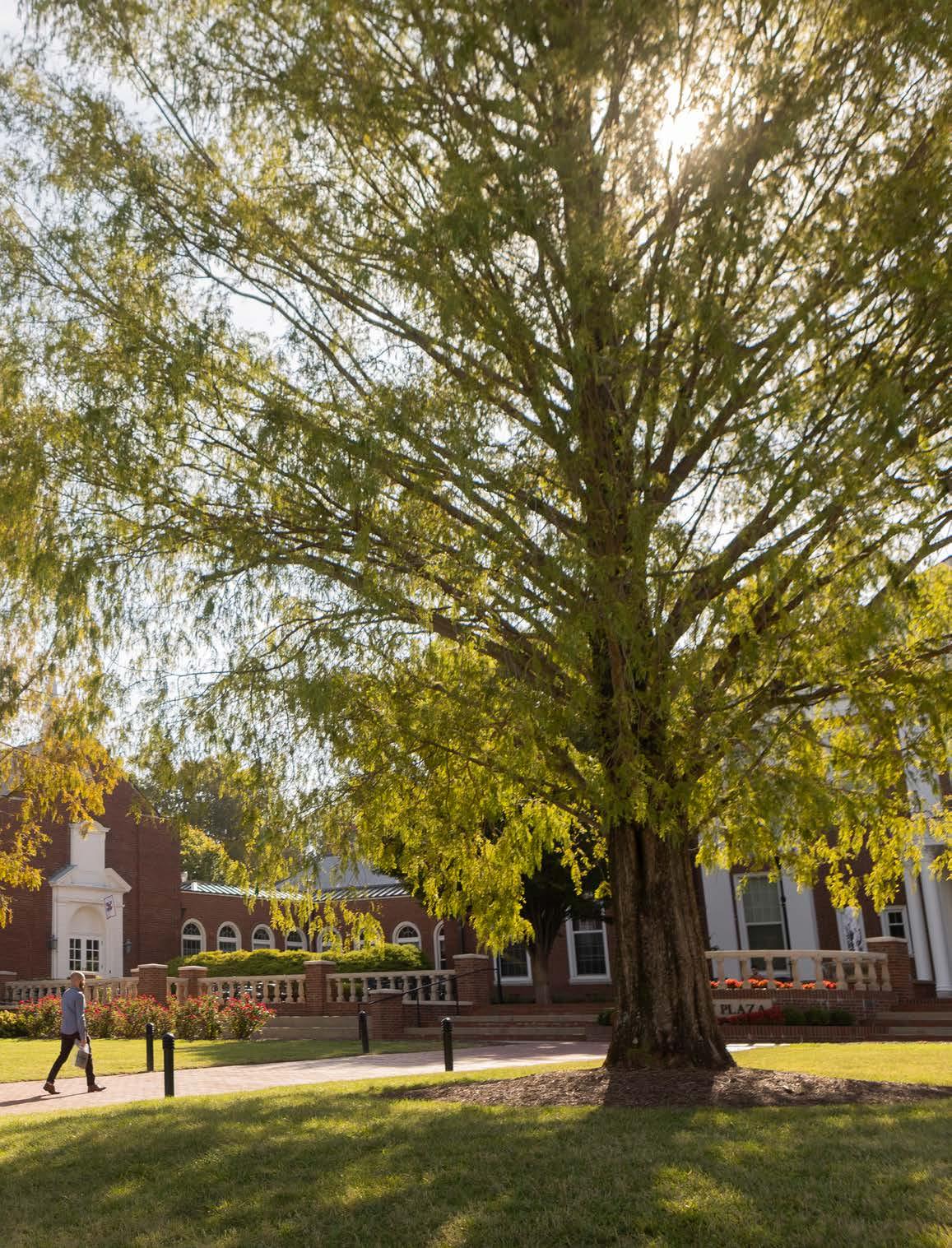
“Neither Good, nor Bad, nor Neutral”: 4 Questions for Missions in a Digital Age from Annual Missions ConferenceBy Travis Hearne
While evolving technology propels the world to new and digital frontiers, Southern Seminary confronted the unique questions of missions in a technological age at Future Shock, the 2023 Missions Conference hosted by the Bevin Center for Missions and Mobilization, on September 15. The event brought together experts on missions and technology to tackle the pressing challenges of modern digital tools and platforms reshaping the global missions' landscape.
"The digital world is clearly a world in need of the gospel," said J. Keith McKinley, professor of missions at Southern Seminary and Director of the Bevin Center. "But that world is fraught with dangers and theological/ ecclesiological landmines. The dangers include various addictions and physiological changes in our brains, as well as exposure to all manner of evil that I do not care to elucidate. Theological issues of personhood and embodiment are especially critical to our missiology. Whereas most would agree that we should take the gospel into the digital world, things quickly get more complicated when it comes to discipleship, community, and being the church in a virtual realm. This is why we sensed the need to start talking about these issues and
the questions we must be thinking about concerning missions in the digital world."
Jason Thacker, professor at Boyce College, author of Following Jesus in a Digital Age (B&H), and editor of The Digital Public Square: Christian Ethics in a Technological Society (B&H Academic), pointed to four fundamental questions Christians should consider to begin thinking about the intersection of faith, technology, and global outreach.
When Thacker asks students this question, they often respond with examples of technology—but it's a more profound philosophical question. "It's not a trick question,” Thacker said. “But it's trying to get to the heart of what these examples of technologies are. Is it merely a tool?" There are two main ways to understand technology, according to Thacker: as a tool and as a formative influence. “We are morally responsible for how we use these tools but technology is always working to form us and our world by driving everything in life to the goal of efficiency.”
Is technology neutral?
“Nothing is really neutral,” Thacker said. “Everything is shaping us toward a particular end. The questions we have to ask as Christians are, ‘to what end?’ and ‘to what purpose?’” Christians must be aware of the shaping effect of technology. “When we fail to acknowledge the formative goals of technology, we can fall victim to the dehumanizing results of seeing everything through the lens of efficiency,” Thacker said. As Paul urges Christians to not
conform to the world in Romans 12:2, believers should recognize that no technology is ever truly neutral before embracing the latest innovations. “Technology is one of the primary disciplers of our culture,” Thacker said. “You didn’t wake up one day addicted to your smartphone. That is a subtle discipleship shaping us to always want something new and to always feel like we’re missing something.”
How can technology be used for the glory of God?
Reading his notes from an iPad, Thacker is not anti-technology. “The question for our age is not if you have a smartphone but how you choose to use your smartphone,” Thacker said. “Many of these companies are at odds with what we believe, but we can use these technologies for the glory of God. We have more access to people than at any time in history and that can be a really good thing.” Thacker said there are countless ways we can build relationships and connect with people in order to share the gospel through the use of technology, but we must remember there are always possible unintended consequences.
“Study after study shows how isolated and disconnected we are as a society,” Thacker said. “The utopian promises often fail and there’s a rapid rise of addiction, misinformation, and belief in the lie that all the information and social connectivity in the world will improve our lives.” Technology, according to Thacker, can also feed into a “hyper-individualism”
that leads people to believe they can construct their own reality rather than existing in a world governed by God. “If we can reach more people with the gospel, praise God!” Thacker said. “But what happens when people are addicted to their phones and more comfortable in virtual worlds rather than fellowshipping with embodied human beings?”
“The Gospel message has always been more than an information transfer,” Thacker said. “The gospel message is about a whole person's transformation that takes place in an embodied community. We serve an embodied savior who suffered a real, not spiritual, death and was physically resurrected. Hope is real and is alive.”
“So what do we do and how do we respond?” Thacker asked. “We go therefore and make disciples of all nations, even in a digital age.”
The Southern Baptist Theological Seminary was excited to host distinguished theologian, author, and professor Michael Horton for the 2023 Norton Lecture series, September 12–13. Horton is the J. Gresham Machen Professor of Systematic Theology and Apologetics at Westminster Seminary and host of the White Horse Inn radio show and podcast.
Horton’s three lectures defended the doctrine of justification in its

historical and theological context as “the great exchange.” According to Horton, the Reformation teaching of Solus Christus, or the teaching that salvation is through Christ alone, must stand at the center for a true and liberating understanding of justification.
“Everybody understands God’s righteousness and his punishment for sins in their conscience and by nature,” Horton said. “It’s the gospel that is surprising. It’s the ‘but God’ that interrupts karma. As the Law mediated the Old Covenant, Christ as the new Adam mediates the New Covenant and provides his righteousness for those who believe.”
Horton believes contemporary challenges to the biblical doctrine of justification undermine the sufficient work of Christ by falling into legalism and antinomianism.
A particular error Horton
corrected was the teaching of the so-called new perspective on Paul, which is commonly associated with James Dunn, E.P Sanders, and N.T. Wright. Contrary to proponents of the new perspective on Paul, the Reformers understood Paul’s teaching on justification correctly as a great exchange where Christ’s righteousness is imputed to the faithful.
“Justification is not about the ethnic problem of inclusion or how to get in and stay in the covenant,” Horton said. “It’s the opposite. The question of the true nature of Israel is provoked by the coming wrath of God, not whether Jews must circumcise Gentiles. The questions they were asking were, 'How must we be saved? Am I among that Israel?”
Therefore, according to Horton, Paul’s concern with legalism was a secondary concern to his main

concern—that Christ alone is our salvation. The Reformation doctrines of the solas, which include Scripture alone, faith alone, grace alone, and to the glory of God alone, all require the central teaching that man is dependent on Christ alone for faith, grace, and true understanding of Scripture.
“Paul totally rejected selfdependence. He saw man as completely depraved and dependent on God. God, through Christ, provided Paul with a salvation that the law could not provide. The prerequisite for that salvation was the quality Abraham had—faith.”
For Horton, the question of justification is not “how we are made right with God?”, but the primary question is “who has been put forward as the mediator for salvation for the world?”
“We can’t add anything to our salvation besides Jesus Christ,” Horton said. “At every moment, we
depend on the mercy of Christ, and everything else comes after that."
Horton’s most recent books are Justification: Volume 1 & 2 and Rediscovering the Holy Spirit: God's Perfecting Presence in Creation
Another book on justification recommended by Horton is Justification: An Introduction by Southern Seminary professor Thomas R. Schreiner.
The 20th Annual Heritage Classic Golf Tournament ended triumphantly as 108 golfers came together at Big Spring Country Club to raise $249,800 for Southern Seminary and Boyce College student tuition, August 21.
“We could not have had a better kickoff to our new academic year and the fall semester," said Vice President of Institutional Advancement Edward Heinze.
"This year, we celebrated two golfers who have played in all 20 tournaments: Dr. Tim Beougher, Professor of Missions & Evangelism, and Chip Hutchison, Content Editor of Kentucky Today. We also enjoyed celebrating a hole-in-one by one of our long-time Louisville patrons and participants, Dr. Tom Benninger. Most importantly, this year’s tournament helped the students of Southern Seminary and Boyce College prepare for service by raising close to $250,000 for the Southern Fund.”
Participants ranged in their golfing skills from amateur to experienced, but Jonah Twiddy and his family were real winners. Twiddy is a Master of Divinity student at Southern Seminary and received the $5,000 Rick Bordas scholarship.
A longtime friend of Southern Seminary, Bordas had a passion for seeing students trained to take the gospel to local churches and to international mission fields. Upon his death in 2013, his family and friends established a scholarship fund in his name.
Twiddy’s wife Leah and oneyear-old daughter Dakota stood with him as he accepted the scholarship. The Twiddys plan to serve in overseas missions as church planters—fulfilling the vision of Bordas and the mission of Southern Seminary.
“Before we take God's word to others, we wanted to know it better ourselves,” Twiddy said. “The Lord introduced Southern Seminary to us as a place where we could pursue that leading while preparing to be sent out. Southern has been exactly what we hoped it would be. Our knowledge of God and his Word is growing daily, and we regularly stop to thank God for all of the rich blessings He has brought into our lives during this season."
President R. Albert Mohler Jr. thanked the participants for their commitment to the work of Southern Seminary and Boyce College.
“God is doing something absolutely remarkable at Southern Seminary and Boyce College,” Mohler said. “It will make a difference on the mission field and in the pulpits of our churches and places we will never go, places we’ll never see. That is absolutely glorious. What a great way to spend a day.”
Plans are already underway for the 21st Annual Heritage Classic Golf Tournament, with organizers hoping to build on this year's
success and continue making a positive impact for the global church. As the tradition carries on, golfers and supporters eagerly anticipate the chance to once again tee off for “the purpose of gospel ministry,” Heinze said.
In this year’s SBTS Alumni & Friends Academy, Rob Plummer, Adam Howell, and several other professors offered guidance to over 200 ministry leaders trying to get back on track in their biblical language skills at the Greek & Hebrew for Life conference, July 28–29.
With the intense duties and demands of ministry, many leaders can slip in their comprehension and utilization of the biblical
languages, says Rob Plummer, Professor of Biblical Studies at Southern Seminary. The purpose of the conference was to help pastors and other leaders retain what they previously learned in the classroom.
“We want to keep pastors and other Christians reading their Hebrew Old Testaments and Greek New Testaments for their entire lives,” Plummer said. “We had a variety of fascinating and practical breakout sessions—everything from how to read ancient papyri text to how to use Greek responsibly in weekly sermon preparation.”
Most of the conference attendees were alumni or current students at Southern Seminary and Boyce College. But many guests, including participants from Japan and New Zealand, connected with the conference through the Daily Dose of Greek, Daily Dose of Hebrew, Daily Dose of Aramaic, and Daily Dose of Latin. While many attendees were Southern Baptists, the conference included Presbyterians, Lutherans, Assembly of God, and Evangelical Free church representatives who all

came to Southern to experience the world-class teaching and breakout sessions in the biblical languages.
For Plummer, Southern Seminary’s decision to continue including Greek and Hebrew in the curriculum and emphasizing the languages in day-to-day ministry represents Southern Seminary’s larger commitment to the final authority of Scripture. While other institutions are dropping Greek and Hebrew requirements, Plummer and Southern Seminary continue to stress the necessity and practicality of reading the Bible in its original languages beyond the classroom.
“If we value the Bible as the Word of God, then we will value the biblical languages,” Plummer said. “If it doesn't matter what the Bible says, then studying the biblical languages is a waste of time. If, however, we continue to uphold the Scripture as our final authority in doctrine and ethics, we have a joyful obligation to study the biblical languages. Of course, some pastors around the world will never have the opportunity to study Greek and Hebrew, and the Lord can still use them mightily. But, if we have this opportunity, how can we pass it up?”
In a 2021 Faculty Address, Plummer presented a systematic case for why seminaries must include biblical languages for ministerial training.
“I confess that I find it embarrassing that evangelical seminaries are reducing biblical languages to an optional part of their MDiv curriculum,” Plummer said. “We’re sending soldiers into battle with muskets and powder horns instead of powerful and accurate weaponry.”
The Carl F. H. Henry Institute at Southern Seminary hosted a forum on October 12 to discuss a Christian understanding of the recent attack on Israel. President Albert Mohler, Ayman S. Ibrahim, and Thomas R. Schreiner joined the forum hosted by Andrew T. Walker to answer pressing questions Christians are asking.
What is the context for the attack on Israel?
Mohler began the discussion by framing the October 7 attack by Hamas as a continuation of Israel’s long fight to exist as a nation.
“Reflecting on the horrors of the previous century, the United Nations established partitions of the Middle East as Jewish and Palestinian states,” Mohler said. “In 1948 the Israelites officially declared themselves as a state, but the surrounding Arab nations did not want to see a Jewish state. In 1967 Israel had to fight to defend itself and ended up conquering territory that was not in its original partition. The Palestinian people after the conflict were unwanted by the neighboring nations and have experienced statelessness ever since.”
“Israel has to fight for its existence every day and this has led to constant skirmishes,” Mohler continued. “But the recent attacks are an existential threat to Israel which has not happened since maybe the 1960s and 1970s.”
What is Hamas?
“To understand Hamas we have to understand the linguistic, political, and ideological context,” Ibrahim said.
Ibrahim is one of the leading Christian scholars of Islam and serves as the Director of the Jenkins Center for Understanding Islam at Southern Seminary.
“Linguistically Hamas means rage with enthusiasm. But it is also an acronym that means a movement of Islamic resistance particularly targeting the Jews. Some Palestinians want to live side by side with Israel, but not Hamas.”
Ibrahim stressed that Hamas is politically and ideologically committed to a version of Islam that is more than praying and fasting.
“For Hamas, jihad is the most honorable deed,” Ibrahim said. “Jihad is armed fighting for the cause of Allah according to the Quran and Muhammed’s statements. It is a call to advance Islam as a ruling political power. They look at the religious texts of Islam and determine that the Jews are the enemy. They also see from Muhammed’s life that he launched attacks on Jews. The fighters for Hamas believe they are doing a service for the divine under the banner of religious texts.”
How does Old Testament Israel relate to the geo-political state of Israel?
With many Christians asking how the current events in Israel relate to the Bible, Schreiner, a New Testament scholar and professor at Southern Seminary, discussed Israel’s role in God’s redemptive plan.
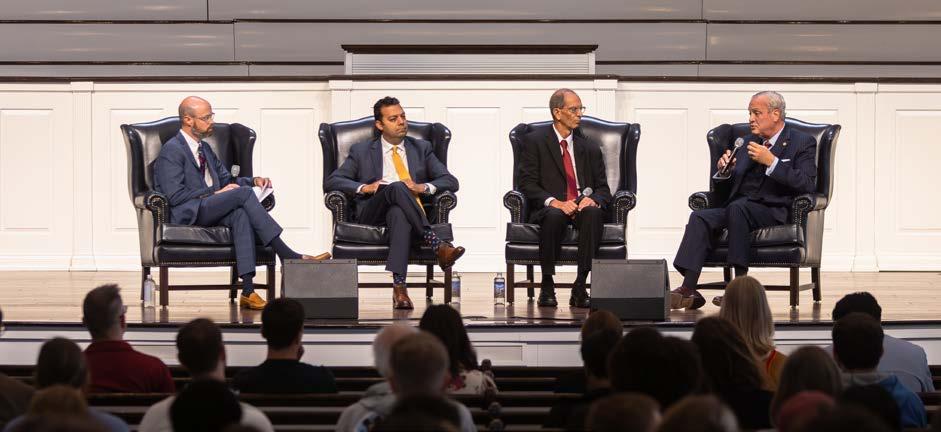
“The issue is very complicated, and believers have different views,” Schreiner said. “God chose the Jews as his covenant people and Paul says the gospel went to the Jews first. My understanding is that the church of Jesus Christ is a fulfillment of the promises to Israel. There is a promise of a future eschatological salvation for the Jewish people as they put their trust in Jesus Christ.”
“We are definitely in the last days,” Schreiner said, “because 1 John 2 says this is the last hour and Hebrews says we’re in the last days. But it is impossible to know if we are in the last days of the last days. Every generation rightly believes we are in the last times.”
Mohler believes the modern state of Israel may have significance for God’s redemptive and historical plan.
“Ultimately all the promises to Israel are fulfilled in Christ,” Mohler said. “But there are historic and territorial promises yet to be fulfilled. I believe 1948
means something. I believe in a literal space-time rule of Jesus from Jerusalem and that Israel is a providential nation—a means of preserving the Jewish people for God’s redemptive purposes in the age to come.”
Why has there been a hesitation for some leaders to condemn the attacks?
“All civilized nations must support Israel in this situation,” Mohler said. “A brutal invasion with beheadings and the taking of hostages is the kind of thing that any civilized society needs to declare as wrong. Some student organizations have taken the side of the Palestinian cause because they say the Palestinian people have been oppressed. They are right that the Palestinians have been oppressed, as Israel has had to worry about implanted jihadists who may cross their border. However, I do not believe we can question Israel’s right to exist and
defend itself. Even if you have no biblical or theological stake in this, you can recognize that if this can be tolerated in Israel it could be tolerated anywhere else.”
“An Islamist group that murdered babies and grandmothers must be condemned,” Mohler said. “If the attacks can’t be condemned by Harvard, then everlasting shame on Harvard.”
Is Israel justified to retaliate in a ground invasion?
“Christian Just War Theory has two parts: when military action is justified and how it is to justly be carried out,” Mohler said. “After the attack, the justification for war has been met. Now Israel must seek to preserve civilian life as best as they can. All Christians should recoil at the danger to civilians and those trapped in the dangers of war. But if Israel does not neutralize the threat of Hamas there will be a threat of escalated war. If this were the United States, the American
people would clearly demand an end to this threat.”
“What Hamas did is suicidal,” Ibrahim said. “They don’t care about their own people. Hamas is using people as human shields, and they know Israel will hesitate to bomb buildings full of civilians.”
What can we be doing as Christians?
“We have to pray that the lord will vindicate and preserve human life,” Mohler said. “Hamas has decided to put rockets under cribs and it is going to be a horrible thing to see. We must pray for God to do something humanely impossible.”
Southern Seminary welcomed Kentucky U.S. Senator Rand Paul as the distinguished speaker for

the Duke K. McCall Leadership Lecture on October 23, 2023. McCall served as the seventh president of the Southern Baptist Theological Seminary (1951–1982) and the yearly lecture series honors his legacy of leadership.
Senator Paul trained as a surgeon and medical doctor before he was elected as a senator of Kentucky in 2010. The lecture stressed the need to hold freedom and tradition together and took place in Alumni Chapel.
“Freedom and tradition are intertwined,” Paul said. “Freedom
needs tradition as faith, knowledge of right and wrong, inspiration, and law and order. But tradition also needs virtue to escape stagnation and decline.”
After the leadership lecture, Paul joined President R. Albert Mohler for a dialogue. Paul and Mohler discussed issues of policy and the importance of ideas in shaping the public sphere.
“Rand Paul is known as a man of action, policy, and ideas,” Mohler said. “His perspective on leadership is one that all of Southern Seminary has anticipated.”
 Senator Rand Paul with students
Senator Rand Paul with students
Southern Seminary trains, educates, and prepares men and women to be effective gospel ministers no matter where the Lord calls them. Now more than ever, the church needs biblically and theologically trained students to confront our increasingly secular age.
Our resolve to be faithful to the Scriptures has enabled us to become one of the most trusted names in theological education.
With thousands of financial partners, faithfully supporting our students, we are also one of the most affordable names in theological education.
Every dollar given to The Southern Fund is one less dollar our students have to pay in tuition.

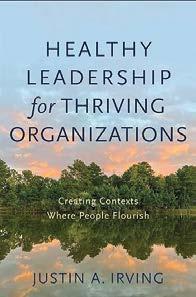
Healthy Leadership for Thriving Organizations: Creating Contexts Where People Flourish
Justin A. Irving
Baker Academic, 2023 | $26.99
The devastating effects of toxic work environments are top news. Everyone seems to understand that healthy organizations nurture flourishing individuals and societies—flourishing that Jesus desires for all of us. How can Christian business and ministry leaders create a positive organizational culture and identity?
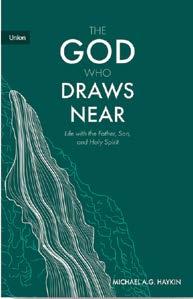
The God Who Draws Near: Life in the Father, Son, and Holy Spirit
Michael A.G. Haykin
Union Publishing, 2023 | $14.99

Revelation (Baker Exegetical Commentary on the New Testament)
Thomas R. Schreiner
Baker Academic | $48.99
The God Who Draws Near seeks to retrieve the key elements of a biblical spirituality and what they mean for our daily lives. Spirituality is very much a positive buzz word today; but in so many of the ways that it is used, it muddies the waters as to the nature of true spirituality.
As with all BECNT volumes, this commentary features the author’s detailed interaction with the Greek text and an acclaimed, user-friendly design. It admirably achieves the dual aims of the series—academic sophistication with pastoral sensitivity and accessibility— making it a useful tool for pastors, church leaders, students, and teachers.

Introducing Islam Set
Ayman S. Ibrahim
Baker Academic, 2023 | $45.49

How to Teach the Old Testament to Christians: Discover How to Unpack All of Scripture for Today's Believers
T.J. Betts
Tyndale Momentum, 2023 | $16.99

I Have PTSD: Reorienting After Trauma
Curtis Solomon
New Growth Press, 2023 | $11.99
This set of resources provides readers with a basic introduction to Islam. Ayman Ibrahim helps readers learn about Muslims, their beliefs, their scripture, their prophet, and key Islamic concepts and terms. Volumes include:
• A Concise Guide to the Quran: Answering Thirty Critical Questions
• A Concise Guide to the Life of Muhammad: Answering Thirty Key Questions
• A Concise Guide to Islam: Defining Key Concepts and Terms
Studying the Old Testament, and its relationship to God’s new covenant, inspires wonder and awe at God’s grand plan of salvation that spans millennia. Tragically, too many preachers and Bible teachers don’t have the time or inclination to dive into the depths of the Old Testament. T. J. Betts, respected professor of Old Testament interpretation at The Southern Baptist Theological Seminary, provides a convenient solution in this book.
In I Have PTSD, Curtis Solomon helps both those who have suffered trauma, as well as their loved ones, to understand the physical, emotional, and spiritual effects of trauma, while offering gospel hope and practical ways to make that hope real in their lives.
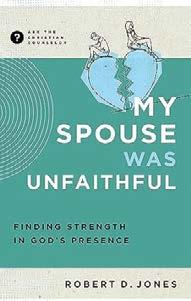
My Spouse Was Unfaithful: Finding Strength in God’s Presence
Robert D. Jones
New Growth Press, 2023 | $7.19
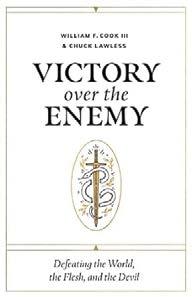
Victory Over the Enemy: Defeating the World, the Flesh, and the Devil
William F. Cook III and Chuck Lawless
B&H Academic, 2023 | $13.49

The Conviction to Lead: 25 Principles for Leadership That Matters (Revised and Updated)
R. Albert Mohler, Jr. Bethany House | $26.99
The consequences of your spouse’s sin cast wide effects on your relationship, family, and future. Counselor Robert D. Jones has walked with many couples in your situation and provides ten steps for moving forward from this betrayal with God-given hope.
Drawing on their extensive expertise on this subject, as presented in their previous B&H volume Spiritual Warfare in the Storyline of Scripture, Cook and Lawless aim to equip everyday Christians to understand what Scripture teaches about spiritual warfare and how believers can practically apply these scriptural principles.
In this updated edition Dr. Mohler has added a new introduction and conclusion based on an additional 10 years of leadership. He has also completely rewritten the chapter "The Digital Leader." The Conviction to Lead will crystallize your convictions while revolutionizing your thinking, your decisionmaking, your communication, and ultimately, those you lead.
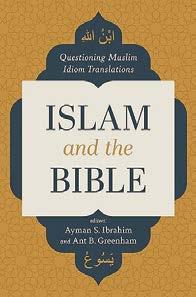
Islam and the Bible: Questioning Muslim Idiom Translations
Ayman S. Ibrahim and Ant Greenham
B&H Academic, 2023 | $49.99
In Islam and the Bible, editors
Ayman S. Ibrahim and Ant B. Greenham invite leading voices, representing a spectrum of approaches, to explore the issues surrounding “Muslim Idiom Translations” of the Bible. This work will be insightful for students, theologians, missiologists, missionaries, and Bible translators seeking wisdom and clarity on gospel contextualization.
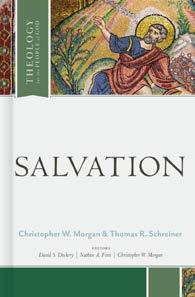
Thomas R. Schreiner and Christopher W. Morgan
B&H Academic, 2024 | $32.24
Coming Soon
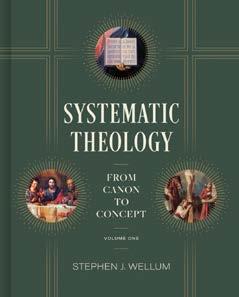
Systematic Theology, Volume 1: From Canon to Concept
Stephen Wellum
B&H Academic, 2024 | $59.99
Coming Soon
Chris Morgan and Thomas Schreiner’s Salvation examines the doctrine of salvation through in-depth explorations of the different aspects of God’s salvific plan for believers. Through in-depth biblical and theological studies of election, calling, regeneration, justification, sanctification, and more, Schreiner and Morgan demonstrate how each part of our salvation is not only for our good but also for God’s glory.
Trinitarian, reformational, and baptistic, Stephen Wellum’s Systematic Theology models a serious evangelical engagement with the Scriptures while being grounded in church history and keenly aware of contemporary issues. Building on decades of research, Wellum formulates doctrine exegetically, covenantally, and canonically for a new generation of students, pastors, church leaders, and seasoned theologians.
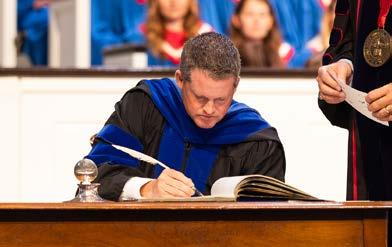
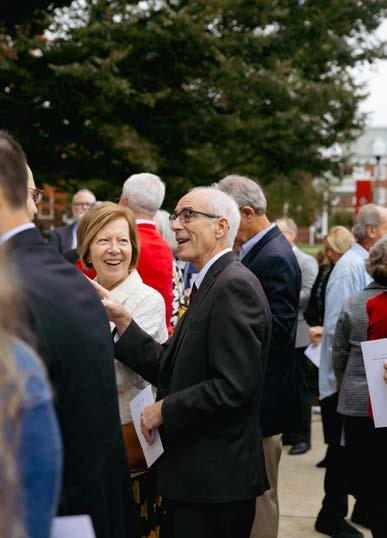
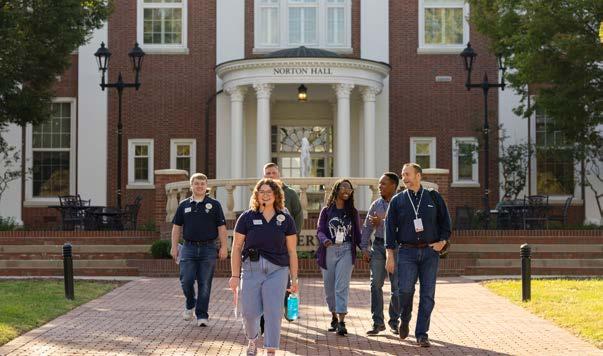



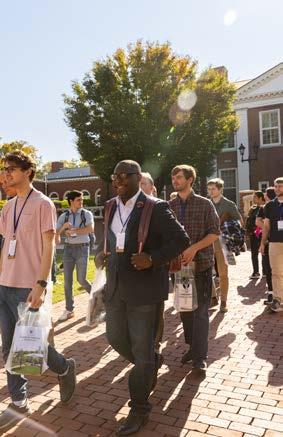



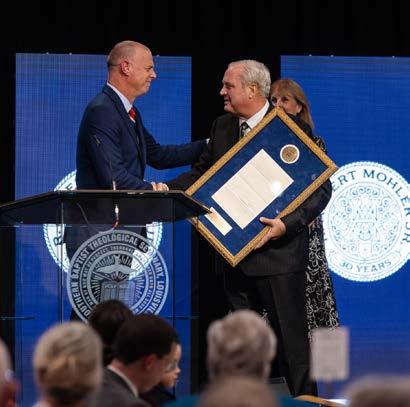

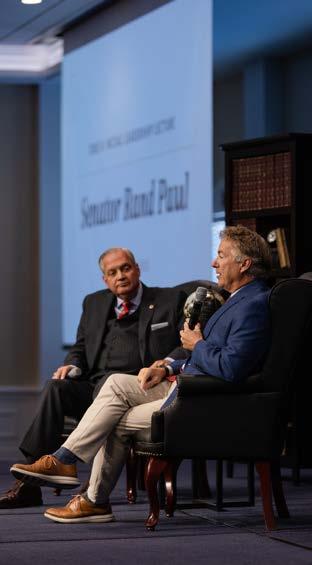



In the second letter to his coworker Timothy, Paul says that “all Scripture” is profitable for teaching and for training in righteousness (2 Tim. 3:16 ESV). Those two words—“all Scripture”—encompass the Old and New Testaments.
WHAT DOES YOUR WHOLE CONGREGATION NEED? THE WHOLE BIBLE. THERE ARE NO UNPROFITABLE PARTS IN SCRIPTURE. THERE ARE NO IRRELEVANT BIBLICAL BOOKS IN THE TASK OF TRAINING IN RIGHTEOUSNESS.
Since 2006, I have had the joy and immense privilege to pastor two Southern Baptist churches. And I have seen the blessing of God upon his people when the “word of Christ” dwells richly among them (Col. 3:16).
I’ve been preaching the Word of God since age sixteen, and my first sermon was nearly twenty-five years ago. After becoming a pastor for the first time in 2006, I wanted to preach through as much of the Bible as I could, and at first, I preached primarily from the New Testament. In hindsight, I wish I would have preached more from the Old Testament. Yet those early years in pastoral ministry provided the opportunity to engage and exposit book after book in the New Testament.
Moving to Louisville in 2010 to enroll in the doctoral program at Southern Seminary, I didn’t return to pastoral ministry until 2012. Once I did, I intentionally incorporated much more of the Old Testament into my preaching schedule, though my practice of expositing books of the New Testament continued as
well. By God’s grace, on May 22, 2022, I completed my exposition of the entire New Testament. This expositional journey took fourteen years of pastoral ministry at two churches (2006–2010; 2012–2022)—and it took 1,106 sermons. No one said preaching through the New Testament would be quick! But pastoring churches that had both morning and evening services allowed for more biblical passages to be proclaimed.
If you are responsible for preaching to an assembly, make it your goal to serve them from both the Old and New Testaments. The Lord has inspired sixty-six canonical books for the nourishment of his people.
Your congregation needs the narratives of the Old Testament. They need to see God’s working through the many men and women whose stories are told. They need to know and learn the names and narratives of Adam and Abraham, Samson and Solomon. Preaching through these stories can help listeners get a sense of the biblical storyline as well as notice the typological patterns that point to the Lord Jesus. The narratives don’t hide the blemishes of the biblical characters. As God’s purposes advance, they do so by his grace and his covenant faithfulness. Preach the Old Testament narratives.
Your congregation needs the genealogies of Scripture. A genealogy may have names you don’t see anywhere else, and it may be full of names that are difficult to pronounce. But the list of generations displays the faithfulness
of God, whose purposes preceded and succeeded every name in the list. Generations come and go, yet the plan of God triumphs in the world. Of special concern for the biblical authors is the line of descent toward the Messiah. God promised a Son who would come, and the genealogies report the generational march toward fulfillment. Preach the genealogies.
Your congregation needs the songs of Psalms. These are songs for every stage and status of life. The psalmists long for God’s help, pray for God’s justice, sing with hope despite the darkness, rejoice in victory, remember God’s previous deeds, give thanks in dire circumstances, and anticipate the coming of Israel’s King who will establish righteousness. Life is full of hardship and blessing, many griefs and undeserved goodness. These songs fill our minds with metaphors for Christian hope and confidence. God is our rock, our fortress, our shield, our defender, our king, and our rescuer. Preach the psalms.
Your congregation needs the wisdom texts. Surrounded by deceit and delusion, we need the light and clarity of biblical wisdom. The books of Job, Proverbs, Ecclesiastes, and Song of Songs point us to God’s design and goodness for the world—so that we can fear the Lord and delight in his Word. We need to know how life typically works, how life nevertheless remains unpredictable, and how God can be trusted from start to finish. The righteous will suffer, but the Lord’s steadfast love and morning-by-morning mercy will
be with us all the way, through every valley, and one day out of the tomb. Preach the wisdom texts.
Your congregation needs the Prophets. The Lord is sovereign over history. He has prophesied the future, and he brings it to pass. He raises up kings and empires, and he brings them down according to his providential appointment. We need the voices of Isaiah, Ezekiel, and Hosea to call us to right worship and righteous living. We need the voices of Jeremiah, Daniel, and Micah to tell us not only of coming judgment but also of future restoration and transformation. We need the prophetic visions to ignite our imagination with pictures of divine justice and the horror of sin. We need the warnings of Joel and Malachi that prophesy the future Day of the Lord—the day of Christ’s return to judge the nations and set all things right. Preach the Prophets.
Your congregation needs the four Gospels. In them, we behold the birth, life, ministry, death, resurrection, and ascension of the Lord Jesus. We hear his many teachings, and we witness his many miracles. We ponder the titles of Son of Man, Son of David, and Son of God. We hear his claims to be the light of the world, the bread of life, and the good shepherd. By studying the Gospels, we are able to make many connections to the Old Testament, for the Gospel writers deliberately tell the stories of Jesus with Old Testament quotations and allusions galore. Here is the
One who has died for our sins and risen in victory. Preach the Gospels.
Your congregation needs the book of Acts. The ascended Lord ministers by his Spirit through his disciples. The mission goes onward and outward. Through the obedience and suffering of the apostles, we see the power of the gospel change lives and impact regions. This biblical history of the early church includes descriptions of their worship, and it provides many examples of their speeches and sermons. We see the perseverance of the apostles through opposition and persecution, and we rejoice at the spread of the Word through the ministries of people like Peter and Paul. Preach the history in Acts.
Your congregation needs the New Testament letters. The letters comprise most of the New Testament books, and they are written to churches or to individuals in order to provide instruction. The letters are rich in theology and application for Christian discipleship. Differing in size and written in response to a variety of occasions, the letters remain relevant and edifying for readers 2000 years later. The writers exalt Christ, build up his church, bring needed corrections, and emphasize our Christian hope for the future. Preach the letters.
Your congregation needs the Apocalypse of John—the book of Revelation. Written initially to seven churches in Asia, the
Apocalypse unveils the sinister principalities at work in the world, and it foretells the glorious return of Christ and the consummation of all things. As the last book of the New Testament, the book of Revelation is also the capstone of the entire canonical revelation that began with Genesis. We behold the risen and reigning Christ who has authority in heaven and on earth. The people of God will be vindicated, and the raging dragon will be defeated. Christ will make all things new. Preach the Apocalypse.
Conclusion
A. W. Tozer once said, “Nothing less than a whole Bible can make a whole Christian.” And if we believe that claim, how should it affect our preaching ministries?
We must bring our assemblies under the fullness of God’s revelation. Over time, we should guide them into all the different parts of Scripture, leaving no literary genre ignored or book unengaged. The blazing center of Holy Scripture is the Son of God—foreshadowed and foretold in the Old Testament, proclaimed and narrated in the New.


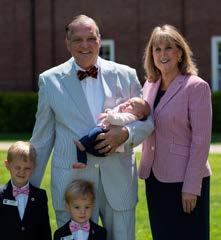
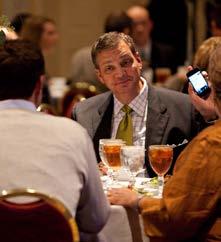

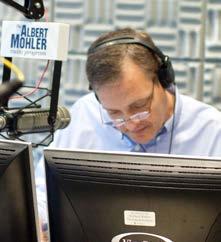

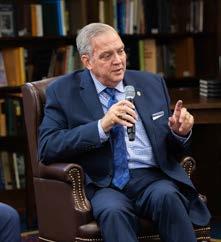

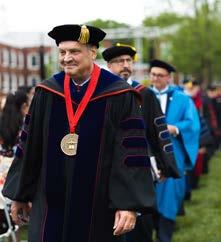
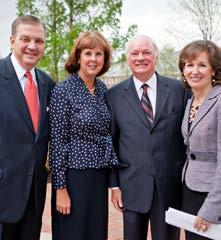







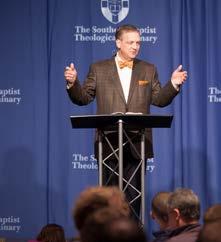
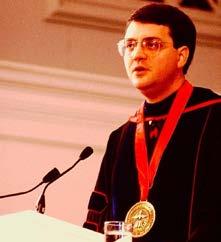
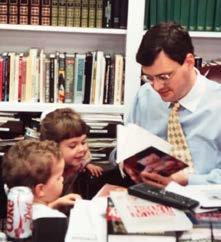

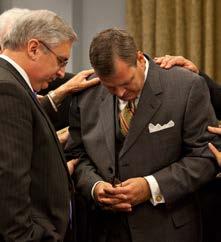
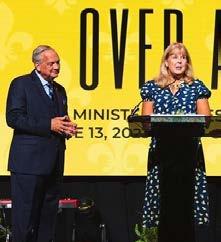
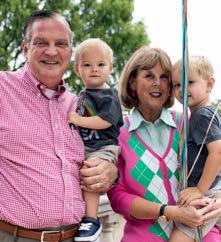
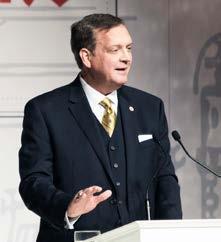




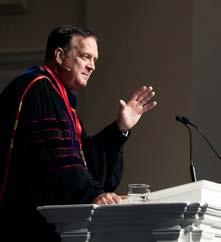
No President has served with more conviction than R. Albert Mohler, Jr. and now, no President has served longer.
On December 21, 2023, President Mohler will arrive at his 11,099 day as President and become the longest-tenured president in the history of The Southern Baptist Theological Seminary. In reaching this milestone, Dr. Mohler has also become the longest-serving leader of any Southern Baptist Convention entity! Congratulations Dr. Mohler on your thirty years, four months, and twenty-one days of convictional, faithful leadership as president and for all the days ahead! We thank God for how He has and continues to work through you!
Please join us in congratulating Dr. Mohler by posting a note of congratulations on DECEMBER 21, 2023
Share your note note of congratulations on Instagram, X (formerly Twitter), or Facebook and tagging Southern Seminary and Albert Mohler, or share and comment the Seminary’s post on that day!